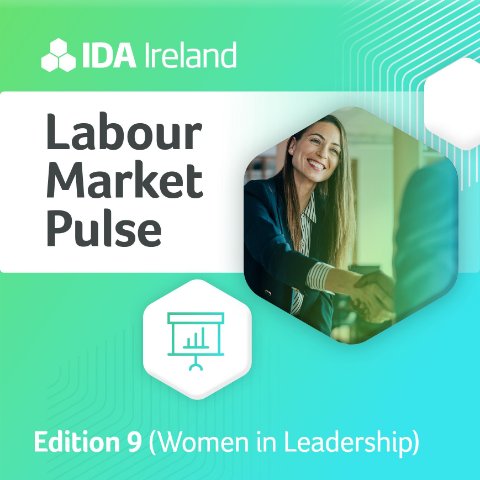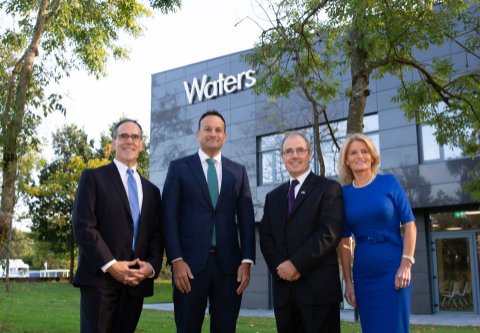Labour Market Pulse published by IDA Ireland in partnership with Microsoft and LinkedIn
Women in Leadership
Ireland has made strides in achieving gender equality, as highlighted by the World Economic Forum’s 2023 Global Gender Gap Report, ranking 8th in Europe and 11th in the world in terms of gender equality. While there is still work to be done in increasing female participation at senior levels, companies are taking a proactive approach, evolving hiring practices and looking at flexible ways of working to improve female participation, and the share of women hired into leadership positions is increasing. Women were hired into 38% of open leadership roles in Ireland in 2022, up from 33% in 2016.
Increasing female participation in the workforce
Expanding talent pools and introducing new hiring practices and flexible ways of working are key to help address existing structural barriers to female advancement in the workforce. For example, the share of women applying to remote or hybrid jobs more than doubled between January 2021 and 2023.
Adopting a skills-first hiring approach, which encourages companies to prioritise candidates based on skills requirements rather than job titles, opens doors to a wider pool of diverse and underrepresented candidates. LinkedIn estimates that a skills-first approach in Ireland would increase the overall talent pool by more than 6-fold and 20% more for women than men in traditionally male-dominated occupations.
The recently published OECD Skills Report for Ireland highlights a strong need to activate the skills of underrepresented groups, including women, people with disabilities, and those without third-level education in order to bolster labour force participation. In the current, tight labour market, where several sectors continue to experience skills shortages, a skills-first approach could significantly increase the applicant pool and provide greater opportunities for both candidates and employers.
Achieving gender equality and ensuring equal representation in leadership is central to Government ambitions and a key focus of policies at the European level. Balance for Better Business, an independent review group established by Government and tasked with improving gender balance in senior business leadership in Ireland has set progressive targets through to the end of the 2023, against which progress is tracked on an annual basis. Performance against targets has been strong to date and considerable progress has been made in women’s representation in leadership positions in Ireland since Balance for Better Business’ launch in 2018. At EU level, Ireland is supporting the EU Directive on Gender Balance on Corporate Boards in the European Council, which aims to see 40% representation of women among non-executive directors or 33% among all directors in listed companies by 2026.
Employment
Meanwhile the Pulse also looks at employment rates in Ireland and highlights a continued slowing in the hiring rates from post-pandemic highs. Hiring rates in March 2023 were over 40% lower than in March 2022 when rates were at their highest. The labour market has softened over the last year as global economic headwinds remain and inflation persists however unemployment sits at 3.8% in May 2023.
Simon Coveney, Minister for Enterprise, Trade and Employment commented:
“Achieving gender balance matters, not only as a question of fairness and equality, but as a business fundamental. No business can afford to neglect half of the available talent pool, and we know that those companies with the highest levels of gender balance also tend to be the best performing. I’m proud of the considerable progress that Ireland has made in recent years to increase women’s inclusion in leadership, as well as our gender-inclusive recovery from the Covid-19 pandemic, which means that there are now more women in work in Ireland than ever before.
“Nevertheless, as this IDA report highlights, we still have a long way to go before we achieve parity, and work remains to be done in ensuring that the high rates of female participation we see in the workforce as a whole translate into leadership teams and the highest executive positions. I welcome this insightful report and remain confident that we take this opportunity to reaffirm our collective commitment to building those pipelines for talent and making gender equality in Irish-based business a reality.”
Commenting on the Labour Market Pulse, IDA Ireland CEO Michael Lohan said: ‘’I welcome the data insights which shows that, although progress towards achieving gender parity in leadership remains slow, Ireland is making steady strides. Groups such as Balance for Better Business help enterprise and government unite in our commitment to accelerate this progress. IDA Ireland is an advocate of the skills first hiring approach as it brings forward the most talented applicants for roles while increasing gender equality in the workplace.’’
Commenting on the Labour Market Pulse, James O’Connor, Microsoft Ireland Site Lead and Vice President of Microsoft Global Operations Service Center, said: “The results of the latest Labour Market Pulse are a timely reminder of the need for organisations to create pathways for women into in-demand and leadership roles in our digital economy. It’s this focus that fuels our own commitment to invest in education programmes, such as Microsoft Dream Space and STEM Passport for Inclusion, which foster an interest in STEM among the next generation of young women. By giving students the opportunity to engage in STEM from an early age and equipping them with the skills to succeed in a digital world, we can help unlock new career opportunities and create a more inclusive workforce in Ireland where everyone has an equal opportunity to participate and succeed.”
Kate O’Sullivan, Senior Director Public Policy & Economic Graph at LinkedIn, added: “The ‘drop to the top’ persists as a feature of female representation in leadership roles globally and as Ireland continues to face a tight labour market, skills-based hiring can help address this. LinkedIn believes this approach is key for us to remove the barriers women face as our research shows that women were almost twice as likely to apply for a job when shown how their skills match those required.”
Full details on the latest insights from Labour Market Pulse can be found at the following link:
https://www.idaireland.com/latest-news/publications/labour-market-pulse-edition-9-9c68ba1d8a5b1f785e614d313982cf94
- Female representation in the workforce continues to increase and companies are taking proactive steps to support greater female participation at all levels.
- Skills-based hiring approach in Ireland would increase the overall talent pool by more than 6-fold and 20% more for women than men in traditionally male-dominated occupations.
Women in Leadership
Ireland has made strides in achieving gender equality, as highlighted by the World Economic Forum’s 2023 Global Gender Gap Report, ranking 8th in Europe and 11th in the world in terms of gender equality. While there is still work to be done in increasing female participation at senior levels, companies are taking a proactive approach, evolving hiring practices and looking at flexible ways of working to improve female participation, and the share of women hired into leadership positions is increasing. Women were hired into 38% of open leadership roles in Ireland in 2022, up from 33% in 2016.
Increasing female participation in the workforce
Expanding talent pools and introducing new hiring practices and flexible ways of working are key to help address existing structural barriers to female advancement in the workforce. For example, the share of women applying to remote or hybrid jobs more than doubled between January 2021 and 2023.
Adopting a skills-first hiring approach, which encourages companies to prioritise candidates based on skills requirements rather than job titles, opens doors to a wider pool of diverse and underrepresented candidates. LinkedIn estimates that a skills-first approach in Ireland would increase the overall talent pool by more than 6-fold and 20% more for women than men in traditionally male-dominated occupations.
The recently published OECD Skills Report for Ireland highlights a strong need to activate the skills of underrepresented groups, including women, people with disabilities, and those without third-level education in order to bolster labour force participation. In the current, tight labour market, where several sectors continue to experience skills shortages, a skills-first approach could significantly increase the applicant pool and provide greater opportunities for both candidates and employers.
Achieving gender equality and ensuring equal representation in leadership is central to Government ambitions and a key focus of policies at the European level. Balance for Better Business, an independent review group established by Government and tasked with improving gender balance in senior business leadership in Ireland has set progressive targets through to the end of the 2023, against which progress is tracked on an annual basis. Performance against targets has been strong to date and considerable progress has been made in women’s representation in leadership positions in Ireland since Balance for Better Business’ launch in 2018. At EU level, Ireland is supporting the EU Directive on Gender Balance on Corporate Boards in the European Council, which aims to see 40% representation of women among non-executive directors or 33% among all directors in listed companies by 2026.
Employment
Meanwhile the Pulse also looks at employment rates in Ireland and highlights a continued slowing in the hiring rates from post-pandemic highs. Hiring rates in March 2023 were over 40% lower than in March 2022 when rates were at their highest. The labour market has softened over the last year as global economic headwinds remain and inflation persists however unemployment sits at 3.8% in May 2023.
Simon Coveney, Minister for Enterprise, Trade and Employment commented:
“Achieving gender balance matters, not only as a question of fairness and equality, but as a business fundamental. No business can afford to neglect half of the available talent pool, and we know that those companies with the highest levels of gender balance also tend to be the best performing. I’m proud of the considerable progress that Ireland has made in recent years to increase women’s inclusion in leadership, as well as our gender-inclusive recovery from the Covid-19 pandemic, which means that there are now more women in work in Ireland than ever before.
“Nevertheless, as this IDA report highlights, we still have a long way to go before we achieve parity, and work remains to be done in ensuring that the high rates of female participation we see in the workforce as a whole translate into leadership teams and the highest executive positions. I welcome this insightful report and remain confident that we take this opportunity to reaffirm our collective commitment to building those pipelines for talent and making gender equality in Irish-based business a reality.”
Commenting on the Labour Market Pulse, IDA Ireland CEO Michael Lohan said: ‘’I welcome the data insights which shows that, although progress towards achieving gender parity in leadership remains slow, Ireland is making steady strides. Groups such as Balance for Better Business help enterprise and government unite in our commitment to accelerate this progress. IDA Ireland is an advocate of the skills first hiring approach as it brings forward the most talented applicants for roles while increasing gender equality in the workplace.’’
Commenting on the Labour Market Pulse, James O’Connor, Microsoft Ireland Site Lead and Vice President of Microsoft Global Operations Service Center, said: “The results of the latest Labour Market Pulse are a timely reminder of the need for organisations to create pathways for women into in-demand and leadership roles in our digital economy. It’s this focus that fuels our own commitment to invest in education programmes, such as Microsoft Dream Space and STEM Passport for Inclusion, which foster an interest in STEM among the next generation of young women. By giving students the opportunity to engage in STEM from an early age and equipping them with the skills to succeed in a digital world, we can help unlock new career opportunities and create a more inclusive workforce in Ireland where everyone has an equal opportunity to participate and succeed.”
Kate O’Sullivan, Senior Director Public Policy & Economic Graph at LinkedIn, added: “The ‘drop to the top’ persists as a feature of female representation in leadership roles globally and as Ireland continues to face a tight labour market, skills-based hiring can help address this. LinkedIn believes this approach is key for us to remove the barriers women face as our research shows that women were almost twice as likely to apply for a job when shown how their skills match those required.”
Full details on the latest insights from Labour Market Pulse can be found at the following link:
https://www.idaireland.com/latest-news/publications/labour-market-pulse-edition-9-9c68ba1d8a5b1f785e614d313982cf94


